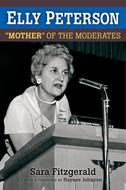Guest blog: Michigan Republican presidential primary edition

Guest blogger Sara Fitzgerald is the author of Elly Peterson: “Mother” of the Moderates , a biography of one of the highest ranking women in the Republican Party that was published by the Press in hardcover in 2011. The paperback edition of Elly Peterson is available next month.
As this year’s Michigan Republican presidential primary approaches, the outcome for native-son Mitt Romney is still far from certain—despite his apparent advantages in fund-raising and organization.
However, a little-known story about the 1976 Michigan primary underscores the importance of good staff work in a national campaign. It turns out that in the spring of that year, the campaign of President Gerald R. Ford came very close to missing the filing deadline in Michigan, the president’s long-time political base.
The story turns up in the personal papers of Elly Peterson, the moderate Republican leader who is the subject of my recent book, Elly Peterson: “Mother” of the Moderates. Peter Fletcher, then the Republican national committeeman from Michigan, confirmed his role in the episode when he provided a videotaped oral history for the Michigan Political History Society several years later.
On March 15, 1976, four days before the primary’s filing deadline, Fletcher discovered that the Ford campaign had failed to file the necessary papers to get the president’s name on the Michigan primary ballot.
Peterson was an old friend of Fletcher’s; at that point, she was serving as the volunteer co-chair of ERAmerica, but had not yet been recruited to join the Ford campaign, where she later served as a deputy chairman. Fletcher wrote and told her that when he had tried to alert the President Ford Committee about the problem, “the big legal brains said I was wrong. Sent them back to their law books and they called back confessing I was right.”
Fletcher was asked to go to Detroit Metropolitan Airport and wait so that he could hand-deliver the appropriate papers after they arrived on a plane. He told Peterson they never arrived. He concluded cynically: “Renews my confidence in the strong hands of leadership in which we have entrusted the future of our nation.” Fletcher eventually received the affidavits, and said he got them delivered with only two hours to spare.
Ford’s name went on the ballot, and he beat Ronald Reagan in the May 18 primary by a margin of 2 to 1, stemming a tide of primary defeats that might have ended his presidential election hopes right there. That night, he captured 55 delegates to 29 for Reagan. Reagan eventually lost the nomination to Ford by a margin of 1,070 to 1,187 Republican convention delegates. If Reagan had captured all 84 Michigan delegates in that topsy-turvy campaign year, it might have made the decisive difference in the race.
As this year’s Republican primary battle drags on, placements on primary ballots could become even more important to the remaining candidates. In my home state of Virginia, for example, Romney and U. S. Rep. Ron Paul are the only candidates who completed the stringent requirements to get on the state’s “Super Tuesday” primary ballot. Former House Speaker Newt Gingrich, who now lives in the state, did not file the necessary petitions on time.
In the 1960s, Elly Peterson often observed that women were more willing to do the kind of detail-oriented political jobs that men were unwilling to do. Fifty years later, that kind of attention to detail can still make or break a campaign.



